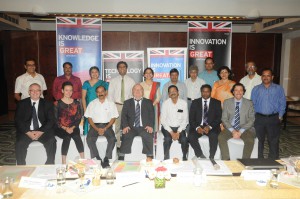
A delegation of six UK experts representing the member universities of the UK Centre for Marine Energy Research (UKCMER) as well as Scottish Association for Marine Science visited Ahmedabad, Chennai, and Kolkata to explore sustainable research partnerships with India in wave and tidal energy.
It is noteworthy that the University of Edinburgh has already entered into a Memorandum of Understanding with IIT Madras and hopes to accomplish the same with other relevant institutions in India.
The next day, a workshop was organised wherein the visiting UK delegates showcased their institutions’ capabilities and facilities, as well as highlighted avenues for bilateral collaborations. For instance, the UK India Research and Education Initiative could be tapped into to facilitate researcher mobility; also the highly anticipated Newton Bhabha funding programme might foster researcher exchanges. The workshop culminated with the identification of a bunch of opportunity titles for potential joint UK-India projects including resource assessment and mapping, river basin technologies, and affordable condition monitoring. If you missed out on attending the workshop in Chennai, please drop me a line to find out about the visiting UK experts and how to connect with them to explore potential UK-India partnerships.
We had a round table meeting with relevant stakeholders from the academia, non-profit organisations, and government. Several key issues pertaining to the deployment of wave and tidal energy in the region were broached upon – environmental impact assessment of ecologically sensitive areas such as the Sunderbans, cost vs. opportunity, engaging key stakeholders early on i.e. at the planning stage, and working closely with the academia for proof of concept studies.
We spent the final day of this hectic 5-day programme in the Sunderbans delta to get a reality check! With thanks to the West Bengal Renewable Energy Development Agency for organising a boat trip, we coasted along the Durgaduani creek to get a sense of the existing challenges and opportunities in tapping its potential in tidal energy. As our boat was sailing along the creek, I was hoping to spot the much-feared and revered Bengal tiger, but in vain!
As a follow up to this programme, a report on the proceedings in the three cities will be published in the near future. Please watch for updates here. I also want to thank my colleagues who made this 5-day programme possible – Naman, Sam, Anita, Vidya, Reshmi, Haimanti, and Sejuti! Kudos to all!
